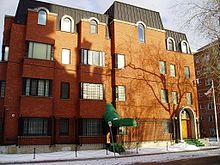
The foreign relations of Iran are the economic and diplomatic relationships between the Iranian government and governments of other countries. Geography is a very significant factor in informing Iran's foreign policy. Following the 1979 Iranian Revolution, the newly formed Islamic Republic, under the leadership of Ayatollah Khomeini, dramatically reversed the pro-American foreign policy of the last Shah of Iran Mohammad Reza Pahlavi. Since then the country's policies have oscillated between the two opposing tendencies of revolutionary ardour to eliminate Western and non-Muslim influences while promoting the Islamic revolution abroad, and pragmatism, which would advance economic development and normalization of relations. Iran's bilateral dealings are accordingly sometimes confused and contradictory.
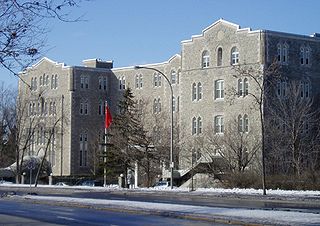
The Embassy of the People's Republic of China in Canada is the embassy of China in Ottawa, Ontario, Canada. China purchased the building at St. Patrick Street in 1972, soon after diplomatic relations were established between Canada and the PRC. The structure had been built by the Sisters of Good Shepherd who had used it as a convent for several decades. The Chinese government paid some $1.6 million for it. In the mid-1980s a major expansion of the structure was completed. The embassy is located in the Lower Town neighbourhood with the rear of the embassy looking out on the Rideau River.

The Embassy of Iraq, Ottawa is the embassy of Iraq in Ottawa, Ontario, Canada. It is located at 189 Laurier Ave. East.

The Interests Section of the Islamic Republic of Iran in the United States is a part of the Pakistani Embassy in Washington, D.C., and is the de facto consular representation of the Islamic Republic of Iran in the United States.
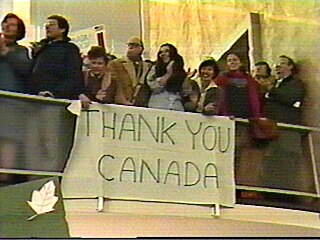
The "Canadian Caper" was the joint covert rescue by the Canadian government and the CIA of six American diplomats who had evaded capture during the seizure of the United States embassy in Tehran, Iran, on November 4, 1979, after the Iranian Revolution, when Islamist students took most of the American embassy personnel hostage, demanding the return of the US-backed Shah for trial.
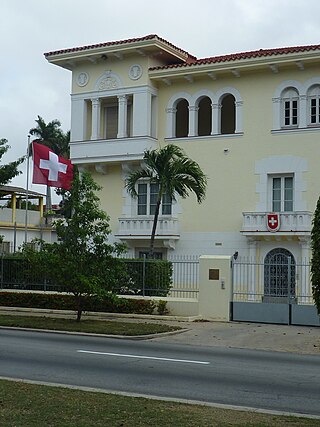
A protecting power is a country that represents another sovereign state in a country where it lacks its own diplomatic representation. It is common for protecting powers to be appointed when two countries break off diplomatic relations with each other. The protecting power is responsible for looking after the protected power's diplomatic property and citizens in the hosting state. If diplomatic relations were broken by the outbreak of war, the protecting power will also inquire into the welfare of prisoners of war and look after the interests of civilians in enemy-occupied territory.

Iran–Serbia relations are diplomatic relations between the Islamic Republic of Iran and the Republic of Serbia. Iran has an embassy in Belgrade and Serbia has an embassy in Tehran. In 2017, the government of Serbia announced that in order to improve bilateral relations as well as to attract tourists and investors to Serbia, it has passed a legislation to abolish visa requirements for citizens of Iran and India intending to travel to the country.

Canada and Iran have had no formal diplomatic relations since 2012. In the absence of diplomatic representation, Italy acts as the protecting power for Canada in Iran and Switzerland acts as Iran's protecting power in Canada.

The Embassy of the United States of America in Tehran was the American diplomatic mission in the Imperial State of Iran. Direct bilateral diplomatic relations between the two governments were severed following the Iranian Revolution in 1979, and the subsequent seizure of the embassy in November 1979.

Brazil–Iran relations are the bilateral relations between the Federative Republic of Brazil and the Islamic Republic of Iran. Relations are characterized by economic and diplomatic cooperation and are quite friendly. Iran has a productive trade balance with Brazil. The two governments signed a document to bolster cooperation during the G-15 Summit in Tehran in 2010. However, since the election of former Brazilian president, Dilma Rousseff, relations between the two countries recently have deteriorated greatly, following Rousseff shifting Brazil away from Iran due to Iran's violation of human and civil rights. Mahmoud Ahmadinejad's media adviser, Ali Akbar Javanfekr, was quoted as stating that Rousseff had "destroyed years of good relations" between them. He denied making such a statement.

The Former Embassy of Iran in Washington, D.C. was the Imperial State of Iran's diplomatic mission to the United States. Direct bilateral Iran–United States relations between the two governments were severed following the Iranian Revolution in 1979, and the subsequent seizure of hostages at the U.S. Embassy in Tehran, Iran.
Gholhak Garden is a British overseas diplomatic compound in the northern Tehran neighborhood of Gholhak in Iran, about 3 miles (4.8 km) from the centre of Tehran. The sprawling tree-lined site, bordered by high walls, measures 200,000 square metres and houses British diplomats and their families. The compound is also home to the Tehran War Cemetery. The site has been at the centre of diplomatic controversy between Britain and Iran over ownership and management of the grounds.

The 2011 attack on the British Embassy in Iran was a mob action on 29 November 2011 by a crowd of Iranian protesters who stormed the embassy and another British diplomatic compound in Tehran, Iran, ransacking offices and stealing documents. One small building was set on fire during the incident and several people were injured. The Iranian government publicly condemned the violence.

The Embassy of the United Kingdom in Tehran is the United Kingdom's diplomatic mission to the Islamic Republic of Iran. It is located at 172 Ferdowsi Avenue in Tehran.

Diplomatic relations between Iran and Uruguay were established in 1983. Iran has an embassy in Montevideo. Uruguay has an embassy in Tehran.

The Embassy of Iran in London is the diplomatic mission of Iran in the United Kingdom. It is located in a terrace overlooking Hyde Park in South Kensington, Westminster, London, next to the embassy of Ethiopia. Iran also maintains a Consular Section at 50 Kensington Court, South Kensington. The embassy building, along with the Ethiopian Embassy and the Polish Institute and Sikorski Museum, is one of a group of Grade II listed stucco buildings.
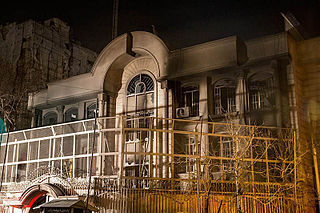
The 2016 attack on the Saudi diplomatic missions in Iran was a mob action on 2 January 2016 by protesters against the execution of a prominent Saudi Arabian Shi'a cleric. Mobs stormed the embassy in Tehran and the Saudi consulate in Mashhad and ransacked them. The embassy building was set on fire with Molotov cocktails and petrol bombs. During the attacks, the police arrived and dispersed protesters from the embassy premises and extinguished the fire.

Bilateral relations exist between the countries of Bahrain and Iran. Since the 1979 Iranian Revolution, relations between the two countries have been strained over various geopolitical issues such as the interpretations of Islam, aspirations for leadership of the Islamic world, and relations with the United States, Europe, and other Western countries. In addition, Iran has been severely critical of Bahrain for hosting the United States Fifth Fleet within the Persian Gulf at the Naval Support Activity Bahrain base.
